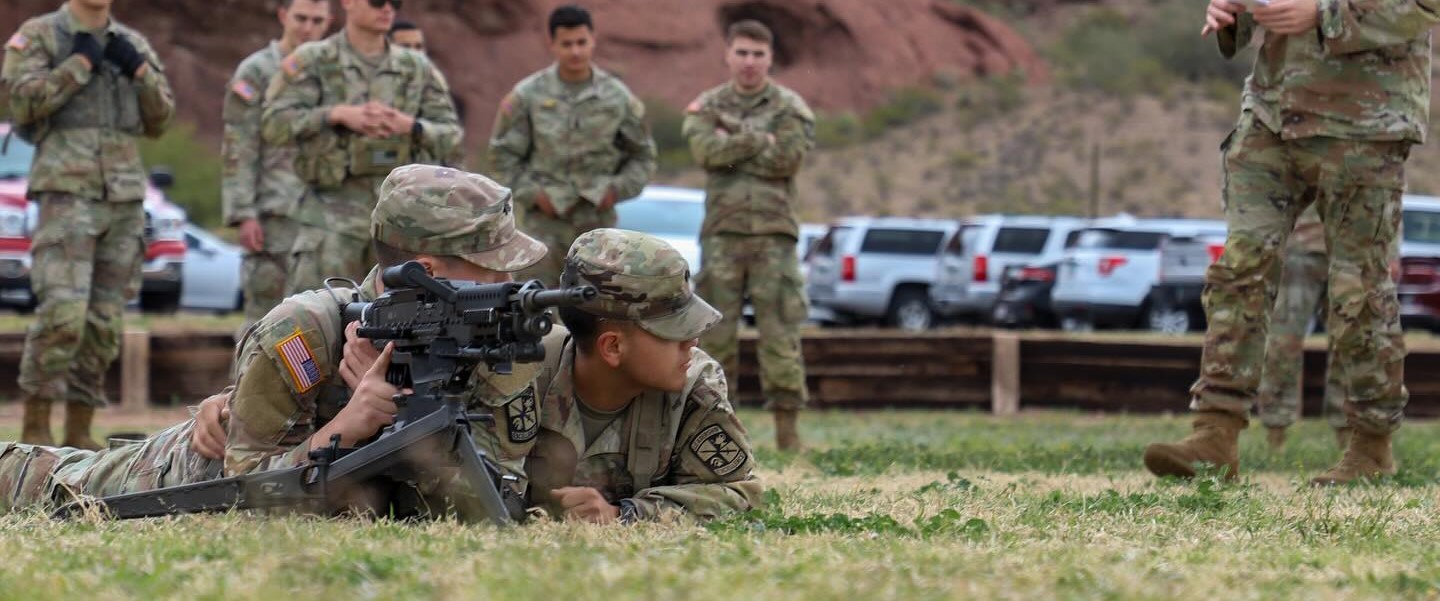Upon becoming Lieutenants, graduates of the Army ROTC program are selected to serve in one of the more than twenty Officer career fields. They assume their duties armed with the superb leadership and managerial skills that have long been the hallmark of the Army ROTC program. From the day they arrive at their first unit of assignment, they shoulder responsibilities that far exceed those routinely entrusted to those in the civilian sector of similar age.
This is a synopsis of each of the Officer career fields in which Army ROTC graduates may be found.
The mission of the Adjutant General Corps is to help plan, operate, and manage military personnel activities. These include: personnel services, personnel strength management, personnel automation, band operations, and postal operations.
The Air Defense Artillery protects our forces and selected physical assets from aerial attack, missile attack, and surveillance. Service in this branch calls for extensive expertise in handling the highly specialized air defense weapons systems in use within a combined arms environment.
Armor Officers are responsible for tank and cavalry/ forward reconnaissance operations on the battlefield. The three subcomponents of the Armor branch (Armored Calvary, Air Cavalry and Armor) provide the Army with what many consider to be its most powerful reconnaissance and offensive forces.
An Officer within the Aviation Branch is first an expert aviator but is also responsible for the coordination of all Aviation operations including maintenance, control tower operations and tactical field missions. From providing quick strike and long-range target engagement during combat operations to transporting troops and supplies, Army Aviation Officers play a critical role.
The Chemical Corps provides expertise in chemical, biological, radiological and nuclear (CBRN) warfare matters. It also has responsibility for a wide variety of research, development and logistical functions relating to CBRN systems and combat development.
The Corps of Engineers is one of the most diversified branches of the Army. It is a key member of the Combined Arms Team, and its activities encompass military engineering, civil works, and all related planning, organization, training, supply and maintenance activities.
Officers in the Cyber Electromagnetic Branch are responsible for conducting full spectrum Army cyberspace operations that ensure U.S. and allied freedom of action in cyberspace; yet denying the same to our adversaries.
The Army's Field Artillery Branch is responsible for neutralizing or suppressing the enemy by cannon, rocket, and missile fire. As such, it plays the central role in the integration of all fire support assets in Combined Arms Operations.
The Army's Finance Corps is responsible for sustaining operations through purchasing and acquiring supplies and services. Officers in the Finance Corps make sure commercial vendors are paid, contractual payments are met, and Soldiers are promptly paid.
The Infantry is charged with a key mission -- to close with the enemy by fire and maneuver, to destroy or capture him, and to repel his assaults by fire, close combat, and counter-attack. The modern Infantryman may fight on foot, or go into action by parachute, helicopter, assault boat or the armored Bradley Fighting Vehicle.
The Medical Service Corps provides scientists and trained specialists in the various fields allied to medicine. Additionally, they provide Officers that are technically qualified in the areas of administration, supply, environmental sciences and related endeavors.
This branch of the Army focuses on cryptology, signals intelligence, imagery intelligence, human intelligence, and counter-intelligence activities. Among its other activities are electronic warfare, operations security, interrogation of enemy prisoners, and surveillance of enemy activities.
Those in the Military Police Corps provide key law enforcement functions for our Army. In times of armed conflict, they perform area security functions as well as enemy prisoner of war confinement activities and resettlement functions.
Army Nurses contribute immensely to the effort to provide high quality, easily accessible, and cost-effective healthcare to Soldiers and their families. They work in various clinical specialties, serve in hospitals with units in the field, and in staff positions throughout our Army.
Ordnance Officers ensure weapons systems, vehicles and equipment are available - and operating properly. They also oversee the development, testing, fielding, handling, storage, and disposal of all types of Army munitions.
Quartermaster Officers make sure equipment, materials and systems are available and functioning for missions. As such, they provide supply support for Soldiers and units in both field and garrison settings.
Signal Corps Officers lend expertise to the critical aspects of planning, installing, integrating, operating, and maintaining the Army's voice, data and information systems, services and resources. They employ the latest communications and automation technology to support requirements extending from the White House to the farthest foxhole on the battlefield.
Officers serving in the Transportation Corps are experts in the systems, vehicles, and procedures used in moving troops and supplies for the Army. They play an integral role in the logistical planning process for every overseas deployment of our military forces.
